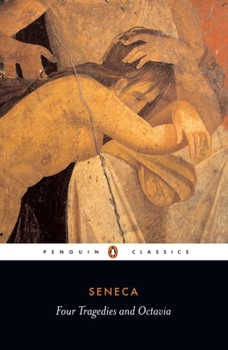Thyestes / Phaedra / Troades / Oedipus / Octavia
Select Format
Select Condition 
Book Overview
Customer Reviews
Rated 4 starsThe flip side of Stoicism
There is a reason that one never sees a tragedy by Seneca on stage; his works were probably never meant to be performed and the lack of any even minimal stage directions is just one of many things about these tragedies that hint at the author's likely lack of interest in ever sending his works to the theater. Tragedy was merely a useful structure in which Seneca found a way to present the underlying viewpoint of life that...
3Report
Rated 5 starsForget what you know about classical tragedy...
And forget what you know about Seneca the Stoic. In his tragedies, the younger Seneca gives full reign to what Nietzsche later (and perhaps unrelatedly) recognized as the Dionysian: lust, anger, revenge, and unadulerated humanity in its most elemental. Although some apprecition of classical mythology is needed to enter these texts fully, once you're in them, you look around, and find yourself in a house of horrors or else...
1Report















